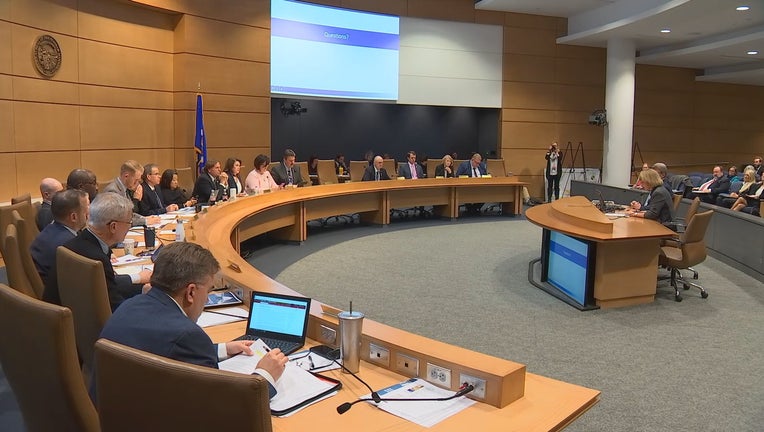Minnesota watchdog says he alerted FBI about tribal overpayments

ST. PAUL, Minn. (FOX 9) - Minnesota’s top watchdog said Wednesday that he’s alerted the FBI and U.S. attorney’s office about $29 million in unauthorized payments to two Native American tribes.
The state Department of Human Services has admitted fault for the payments, which it made over a period of five years for opioid treatments that never happened as the agency claimed they did. The payments involved federal money that DHS distributed.
The nonpartisan legislative auditor, Jim Nobles, said in a report released Tuesday that DHS broke state law by not documenting who, why and when the payments were authorized. A day later, attention turned to how the White Earth and Leech Lake tribes used the money, and why they refused to cooperate with Nobles’ investigation.
Nobles said he lacked clear authority to force tribal leaders to cooperate. Instead, he met with the FBI, U.S. attorney and the U.S. Health and Human Services Department’s inspector general unit, which he said have jurisdiction.
“It’s my understanding that the tribes will face some questions about how the money was actually used. It is a lot of money,” Nobles told lawmakers Wednesday. “The federal government is paying it through the state for a certain specific categorical, programmatic purpose, and the federal government will want some assurance that it was spent for that purpose.”
Kevin Smith, a spokesman for the FBI’s Minnesota office, confirmed that the bureau is “aware of the situation” and that an FBI agent was among the federal officials who met with Nobles.
But U.S. Department of Justice policy bars the FBI from confirming or denying open investigations, Smith said.
There is no evidence that either tribe used the money improperly, though no one has said how White Earth and Leech Lake used the extra funds.
DHS was paying the tribes $455 a day for each patient that was taking opioid treatment medication at home, Nobles has said. That is the so-called “encounter rate,” and should only be paid when a patient actually comes to a medical facility for treatment.
Wednesday, lawmakers on two Senate committees had a White Earth representative in front of them at a hearing. But they did not ask her any questions about how the money was spent.
The representative, White Earth behavioral health assistant director Danielle Stevens, did not volunteer the information, either.
“I’m not prepared to state why or why not there was a response (to the legislative auditor),” Stevens told lawmakers.
A Leech Lake member who testified in front of a separate group of lawmakers Tuesday also faced no questions about spending.
Instead, two lawmakers – one from both political parties – defended the tribes against suspicion Wednesday.
“My concern is that there’s kind of a cloud hanging over this public statement that they’re being investigated for fraud, and I’m not comfortable with that,” said state Sen. Chris Eaton, DFL-Brooklyn Center.
“As I read the report, I don’t see any hint of fraud,” said state Sen. Jim Abeler, R-Anoka. “I see a hint of poor process and a misunderstanding about what you can do.”
How the tribes spent the unauthorized payments looms large for those who must decide how to return the federal money.
White Earth and Leech Lake representatives have refused to repay the money, saying they were not at fault for the improper payments.
DHS had been pressuring the tribes to do so, pointing to a state law that requires them to do so. But this week, DHS Commissioner Jodi Harpstead softened that stance, and said state lawmakers should work with the agency and the tribes on a solution.
Some Republican lawmakers oppose a bailout for DHS, and have said Minnesota’s biggest state agency should find the money within its own multi-billion dollar budget.
“To the folks around this table, do you know how hard we work to find $29 million for anything?” state Sen. Michelle Benson, R-Ham Lake, said at Wednesday’s hearing.
Nobles, whose investigators interviewed DHS workers about the overpayments, has said no one at the agency provided a rationale for the decision to start making them.
DHS officials determined the payments didn’t pass legal muster in February, but continued making the payments for several weeks until May, Nobles said.
“I think one of the disturbing things is that they kept making the payments, even after they had decided that those payments weren’t in compliance with legal requirements,” he said.
Harpstead has promised a top-down review of her agency’s handling of this and other errors – including a lack of controls against fraud in the state’s child care assistance program. Wednesday, she used the analogy of a Swiss watch’s precision.
Some lawmakers said they were supportive of her efforts, but skeptical of the agency’s bureaucracy.
“I appreciate your Swiss watch analogy. I love that, but I’m afraid there’s some other Swiss going on. I think we have a department that’s got, like, Swiss cheese,” Abeler said. “The holes in there are remarkable, and you’ve inherited that, commissioner.”

